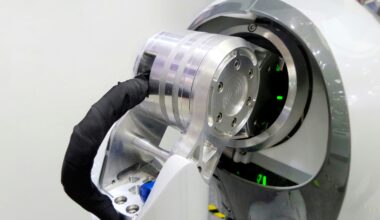Zimmer Biomet Holdings Inc. (NYSE:ZBH) stands as a global powerhouse in musculoskeletal healthcare, with a heritage that traces back nearly a century. Headquartered in Warsaw, Indiana—often dubbed the “Orthopedic Capital of the World”—Zimmer Biomet is a trusted name in the development and delivery of innovative orthopedic solutions that restore mobility, enhance surgical precision, and improve patient outcomes worldwide. Formed through the strategic merger of Zimmer Holdings, Inc. and Biomet, Inc. in 2015, the company unified two legacy leaders in the orthopedic device sector, creating a combined force with a shared mission to shape the future of modern medicine through advanced musculoskeletal technologies.
With operations in more than 100 countries, Zimmer Biomet designs, manufactures, and markets a comprehensive portfolio of products for joint reconstruction, spine, sports medicine, trauma, dental, and extremity care. The company is especially renowned for its leadership in hip and knee replacement systems, where it commands a dominant global market share—approximately 36% in knee implants and 23% in hip implants. Its success is rooted not only in product excellence, but also in a commitment to rigorous clinical validation, surgeon collaboration, and unmatched regulatory expertise.
Zimmer Biomet has consistently set the benchmark for innovation in the orthopedic space, from pioneering personalized implants to launching advanced surgical robotics platforms such as ROSA® Knee and ROSA® Hip systems. These digital technologies integrate real-time data and navigation to enhance surgical accuracy, reduce recovery times, and improve long-term patient outcomes. Moreover, the company’s growing investment in artificial intelligence, smart implants, and cloud-connected surgical tools reflects a long-term vision focused on the digital transformation of musculoskeletal care.
Beyond product innovation, Zimmer Biomet is widely recognized for its strong commitment to compliance, ethics, and sustainability. It operates under strict adherence to FDA regulations and international quality standards, ensuring that all devices meet the highest benchmarks for safety and efficacy. Its robust intellectual property portfolio—with over 5,000 active patents—serves as a significant competitive moat in an industry where regulatory complexity and technological precision form high barriers to entry.
Backed by a resilient business model, global distribution reach, and deep surgeon engagement, Zimmer Biomet Holdings, Inc. continues to shape the future of orthopedics. As populations age and demand for reconstructive surgeries continues to rise, Zimmer Biomet is well-positioned to capitalize on long-term macroeconomic and healthcare trends. Whether through breakthrough device launches, strategic acquisitions, or next-generation robotics, the company remains at the forefront of delivering better outcomes for patients and sustainable growth for investors.
Hedge Fund Sentiment and Analyst Endorsements Signal Upside Momentum
Zimmer Biomet Holdings, Inc. is held by 53 hedge funds as of Q4 2024, ranking 11th among the most favored medical device stocks in Insider Monkey’s database. This hedge fund exposure reflects the institutional confidence in ZBH’s ability to deliver long-term value through operational execution and strategic innovation.
In April 2025, BTIG analyst Ryan Zimmerman reaffirmed a Buy rating on the stock with a price target of $123, citing optimism over new product launches in the hip replacement category. The continued uptake of ZBH’s newer offerings—particularly those integrated with AI and robotic navigation—strengthens the company’s long-term competitive position and suggests further market share gains are on the horizon.
Despite a temporary trimming of its 2025 full-year earnings guidance (now projected at $7.90–$8.10 per share), this revision is viewed as a strategic recalibration rather than a structural weakness. Management cited macroeconomic pressures and integration costs related to recent acquisitions, which are expected to yield synergies and revenue expansion in 2026 and beyond.

CHECK THIS OUT: Gilead Sciences (GILD) is a Top Long-Term Biotech Investment for 2025 and CEL-SCI Corporation: Leading the Future of Cancer Immunotherapy with Multikine®.
Tariff Turbulence: A Temporary Headwind, Not a Structural Threat
Zimmer Biomet, like many U.S. medical device manufacturers, is not immune to geopolitical and economic pressures—particularly the evolving landscape of tariffs on imported goods. In recent months, tariff rates on Chinese medical device imports surged as high as 145%, following a series of policy decisions enacted during former President Trump’s second term. This poses a significant cost burden for U.S. manufacturers who rely on global supply chains, including suppliers in China, Mexico, and Canada.
The medical device sector has responded with growing concern. According to Scott Whitaker, CEO of AdvaMed, the trade group representing medical technology companies, these tariffs are likely to increase healthcare costs across the board. “We cannot afford to drive up the cost of healthcare for patients, or on the healthcare system,” Whitaker warned, noting that programs like Medicare, Medicaid, and the VA will ultimately bear the brunt of these expenses.
Echoing these sentiments, Rick Pollack of the American Hospital Association highlighted the critical importance of tariff exemptions for medical devices. “Disruptions in the availability of these critical devices—many of which are sourced internationally—have the potential to disrupt patient care,” Pollack emphasized in a CNBC interview.
Adding further context, Casey Hite, CEO of Aeroflow Health, stated that the unpredictability of tariffs creates serious pricing challenges: “Businesses can’t pass those costs on to the consumer due to fixed insurance contracts.” He advocated for a gradual, phased implementation of tariffs to allow healthcare organizations to adjust—suggesting a transitionary period over 12–24 months as a more viable solution.
For Zimmer Biomet, this environment presents short-term pricing complexity but not long-term structural decline. The company’s global scale, regulatory fluency, and supply chain diversity provide it with greater flexibility than smaller peers to adapt to and eventually neutralize the impact of tariffs. Moreover, ZBH’s deep relationships with hospitals, surgeons, and insurance networks create a level of demand inelasticity that supports margin stability even in inflationary or tariff-burdened scenarios.
Financial Strength, Strategic Acquisitions, and Innovation Pipeline
Zimmer Biomet’s Q1 2025 earnings demonstrated the company’s operational resilience amid external challenges. Revenues reached $1.91 billion, up 1.1% year-over-year, while adjusted EPS of $1.81 exceeded Wall Street estimates. The company’s strong gross margins and consistent free cash flow provide ample liquidity for ongoing R&D, shareholder returns, and M&A opportunities.
In recent years, Zimmer Biomet has made targeted acquisitions such as OrthoGrid, a surgical navigation firm, and Paragon 28, a leader in foot and ankle devices. These acquisitions are not just additive—they are transformative, helping ZBH to broaden its product ecosystem and accelerate its digital transformation strategy.
ROSA Robotics, the company’s robotic surgical platform, has seen increasing adoption rates. With applications now extending from knees to hips and shoulders, ROSA is well-positioned to become the central operating system for orthopedic surgery. When paired with ZBH’s expanding AI capabilities and real-time navigation technologies, ROSA represents a long-term driver of surgical precision, patient outcomes, and competitive differentiation.
Long-Term Outlook: Undervalued, Underestimated, and Poised for Re-Rating
Currently trading at a forward P/E of ~20x, Zimmer Biomet remains undervalued relative to its large-cap medtech peers, many of which trade above 30x earnings. The EV/EBITDA multiple also reflects a ~28% discount to sector averages, despite ZBH’s higher operating margins and dominant market share.
The compelling valuation case, combined with continued product innovation, stable institutional ownership, and the company’s ability to weather regulatory and supply chain storms, makes Zimmer Biomet a top pick for long-term investors. If broader market conditions stabilize and medical device tariffs ease, a re-rating toward $149–$172 per share is within reach over a 12–24 month horizon.
Conclusion: A Resilient MedTech Leader with Asymmetric Upside
In a sector defined by complexity, regulation, and innovation, Zimmer Biomet Holdings, Inc. stands out as a resilient and resourceful leader. While tariff pressures and reimbursement constraints may create short-term volatility, they are unlikely to diminish ZBH’s durable growth trajectory. Instead, the company is strategically investing in the future of surgery—robotic, intelligent, and personalized.
For investors seeking exposure to long-term demographic trends, surgical automation, and recession-resistant healthcare demand, Zimmer Biomet is a high-quality compounder trading at an unjustified discount. In a market increasingly driven by short-term sentiment, Zimmer Biomet’s fundamentals provide the kind of long-term value that hedge funds and institutional investors quietly accumulate—before the rest of the market catches up.
READ ALSO: Incyte (INCY) is the Next Big Biotech Winner and Bluebird Bio (BLUE) Posts 108% Revenue Growth in Q1 2025 Amid Acquisition Buzz.








